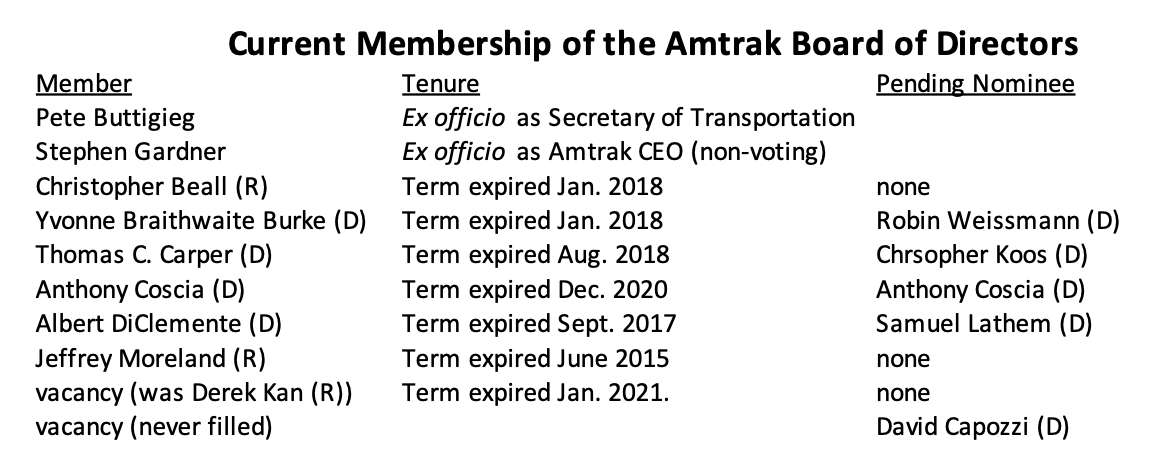When the White House announced a slate of new nominees for the Amtrak Board of Directors at 3 p.m. last Friday, it was not clear who each new members was going to be replacing. But now that the nominees have been officially transmitted (earlier this week), we know:

The recent bipartisan infrastructure law (the IIJA) made changes in the Board’s statute (49 U.S.C. §24302) that placed very specific geographic residency requirements on the 8 Senate-confirmable members of the Amtrak Board:
- 2 must “reside in or near a location served by a regularly scheduled Amtrak service along the Northeast Corridor”
- 2 must reside “outside of the Northeast Corridor” but in a state that has an Amtrak long-distance route
- 2 must reside “outside of the Northeast Corridor” but in a state that has an Amtrak state-supported route
- 2 can reside in any state that has Amtrak service, in or out of the Northeast Corridor
If a person resides in a state that has both long-distance and state-supported service, they can fill either of the B slots or the C slots.
(Apparently, people from South Dakota, Wyoming, Alaska and Hawaii are not allowed to serve on the Amtrak Board of Directors, since their states have no Amtrak service.)
Congress clearly intended this to mean that the Northeast Corridor could have no more than half of the at-large Board memberships (4 of the 8, if both of the “anywhere” seats went to the NEC).
The 5 new nominees are:
- David Capozzi, Gaithersburg, Maryland (NEC)
- Anthony Coscia, New Jersey (NEC)
- Christopher Koos, Normal, Indiana (long-distance)
- Samuel Lathem, Delaware (NEC)
- Robin Weissmann, Bucks County, Pennsylvania (NEC)
President Biden’s choices have used up all 4 allowable Northeast Corridor slots on the Board.
The problem is, there are currently two holdover Board members who Biden’s choices would not replace. One, Jeff Moreland, resides in Texas, which has several long-distance routes and one state-supported route. But the other, Christopher Beall, has a day job running his own investment firm in New York City, giving a high likelihood that he actually resides in the NYC area.
(His original nomination paperwork from 2012 said “Christopher Beall, of Oklahoma,” but that is a Senate custom that lets people put the state where they were born and raised, or went to college, as their home state even if they have been residing elsewhere for years, a la career Foreign Service officers. For example, when the Senate confirmed Carlos Monje to be Under Secretary of Transportation last year, his official paperwork said he was “of Louisiana” even though Carlos has been working jobs in the DC area for the last 20 years and thus residing around here, not Louisiana.)
If the Senate were to confirm all 5 of President Biden’s nominees tomorrow, then the Northeast Corridor would have 5 of 7 active Board seats (71 percent), since Derek Kan’s old seat would still be vacant.
For this reason, and because all five of the new nominees appear to be Democrats (the maximum allowable number, per the statute, from any one political party), it is unlikely that the Senate will move this batch of nominees unless and until the status of the other three (Republican) slots is resolved. It is not known if either Moreland or Beall, or both, want to be nominated for another term, or if the Administration would offer that, if they did.




